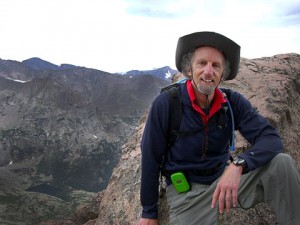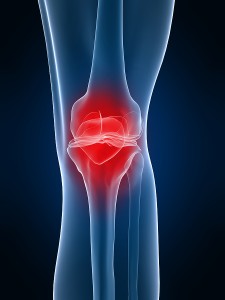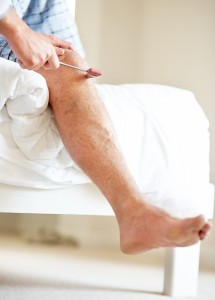Last week I had arthroscopic surgery on my left knee to repair two tears in the meniscus, a pad of cartilage-like material that separates the upper leg bones from the lower ones and absorbs some of the force as you walk and run.
 Thanks to such Colorado activities as mountain climbing, mogul skiing, and trail running I had abused the dear meniscus until finally it gave way. Frayed ends stuck into surrounding tissue like hangnails, causing pain every time I took a step. I lived with it for a few weeks until finally, on a long international flight, my knee announced firmly that it had had enough.
Thanks to such Colorado activities as mountain climbing, mogul skiing, and trail running I had abused the dear meniscus until finally it gave way. Frayed ends stuck into surrounding tissue like hangnails, causing pain every time I took a step. I lived with it for a few weeks until finally, on a long international flight, my knee announced firmly that it had had enough.
Having a knee scoped is something like a rite of passage in Colorado, mainly because of ski injuries. If we had a state surgery to go with our state flower and state animal, it would be repair of a torn meniscus; the clinic I used does some 400 per year. Brits call the procedure “keyhole surgery,” with good reason. The  doctor makes three tiny incisions, pumps saline solution into one to expand the working area, then inserts ingenious devices that resemble a plumber’s snake into the other two. Staring at a computer screen with nary a glance at the patient, he guides one camera-equipped cable on a tour of the ballooned knee, while the other instrument snips loose ends here and there, smooths arthritic bones with a tiny burr saw, and vacuums out the debris.
doctor makes three tiny incisions, pumps saline solution into one to expand the working area, then inserts ingenious devices that resemble a plumber’s snake into the other two. Staring at a computer screen with nary a glance at the patient, he guides one camera-equipped cable on a tour of the ballooned knee, while the other instrument snips loose ends here and there, smooths arthritic bones with a tiny burr saw, and vacuums out the debris.
Apparently the clinic’s main fear comes from the possibility of operating on the wrong knee. I had to circle the left knee on a diagram, write a big “YES” with an indelible marker on my left thigh, and have it signed by two attendants before they sent me into dreamland with general anesthesia. Even so, as a failsafe the clinic schedules all right knees together, then all left knees—the drugged patient, after all, can’t answer questions and most knee injuries aren’t visible from the outside.
Nicky Gumbel, vicar of Holy Trinity Brompton in London, told me he had been “scoped” three times, the third under a local anesthetic that allowed him to watch the progress on a monitor. I’ve observed some surgical procedures while researching the books I wrote with Dr. Paul Brand, but I’m not sure I’m ready to watch one in real time being conducted on my own body.
(In Mumbai, India, in 2008 I stayed with a surgeon who knew Dr. Brand and asked if I wanted to assist at a liver surgery the next day. When he sensed my hesitation he said, “Don’t worry, we’ll have you in scrubs and antiseptic. At most I’ll have you hold a retractor to help keep open the area I’m working on.” He cautioned me that he’d given the honor to several other guests who found it challenging. Some grew squeamish immediately; some kept loosening their grip, which narrowed the area he had to work in. “One man was remarkably calm, though. He kept up strong pressure on the retractor the entire time so that I had a wonderful window into the body. When I finished I looked up to congratulate him and told him he could let go. Nothing happened. It seems that sometime during the surgery my friend had fainted. The weight of his body leaning backwards was what was keeping the retractor taut!” I never got to test my own fortitude because that was the night of the Mumbai terrorist attacks which killed more than 170 people. The city went under lockdown and the hospital had to cancel all non-emergency procedures.)
 As I lay in the recovery room after my own minor procedure last week, I breathed a prayer of thanks for whoever invented the devices that allowed surgeons to maneuver inside my knee without leaving ugly red scars on the surface. For most of human history, people with a torn meniscus or a thousand other ailments would simply have to live with the pain. And especially I am grateful for physical therapists. I worked with one for several months after a broken neck in 2007, and learned that physical and occupational therapy training may include as much basic anatomy as might be offered in medical school. More, therapists have close and extended contact with patients, whereas doctors are under constant pressure from insurance companies to limit face time. Any honest surgeon will admit the limits of the craft: healing and full recovery depend on what happens after surgery, and in that process the physical therapists play an indispensable role.
As I lay in the recovery room after my own minor procedure last week, I breathed a prayer of thanks for whoever invented the devices that allowed surgeons to maneuver inside my knee without leaving ugly red scars on the surface. For most of human history, people with a torn meniscus or a thousand other ailments would simply have to live with the pain. And especially I am grateful for physical therapists. I worked with one for several months after a broken neck in 2007, and learned that physical and occupational therapy training may include as much basic anatomy as might be offered in medical school. More, therapists have close and extended contact with patients, whereas doctors are under constant pressure from insurance companies to limit face time. Any honest surgeon will admit the limits of the craft: healing and full recovery depend on what happens after surgery, and in that process the physical therapists play an indispensable role.
 As it happens, my physical therapist also climbs mountains. We’ve both summited the 54 14,000-foot mountains in Colorado, and as he massages and manipulates my knee we relive our exploits: lightning storms, hail and snow, close calls from rock falls, animal sightings. If all goes well, and I follow his instructions over the next few weeks, I’ll eventually tackle a few more—with renewed gratitude for modern medicine which has mastered the art of repairing that marvelous structure that creates a necessary hinge in the legs that move us through life.
As it happens, my physical therapist also climbs mountains. We’ve both summited the 54 14,000-foot mountains in Colorado, and as he massages and manipulates my knee we relive our exploits: lightning storms, hail and snow, close calls from rock falls, animal sightings. If all goes well, and I follow his instructions over the next few weeks, I’ll eventually tackle a few more—with renewed gratitude for modern medicine which has mastered the art of repairing that marvelous structure that creates a necessary hinge in the legs that move us through life.


Leave a Comment